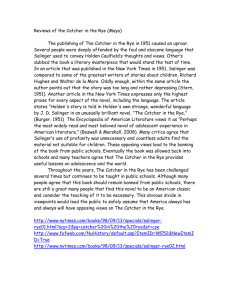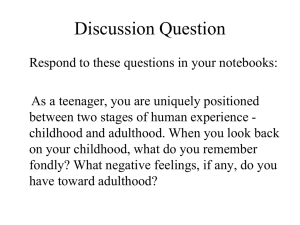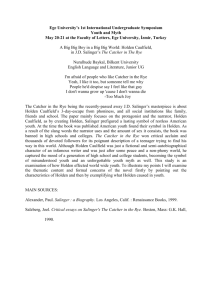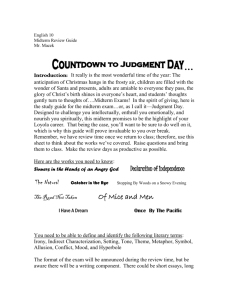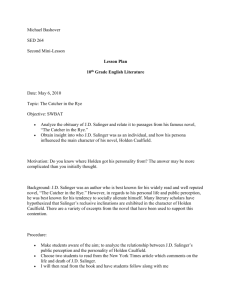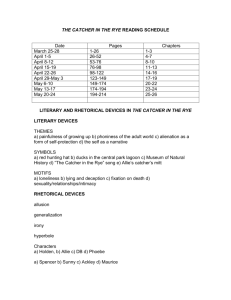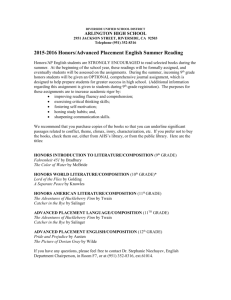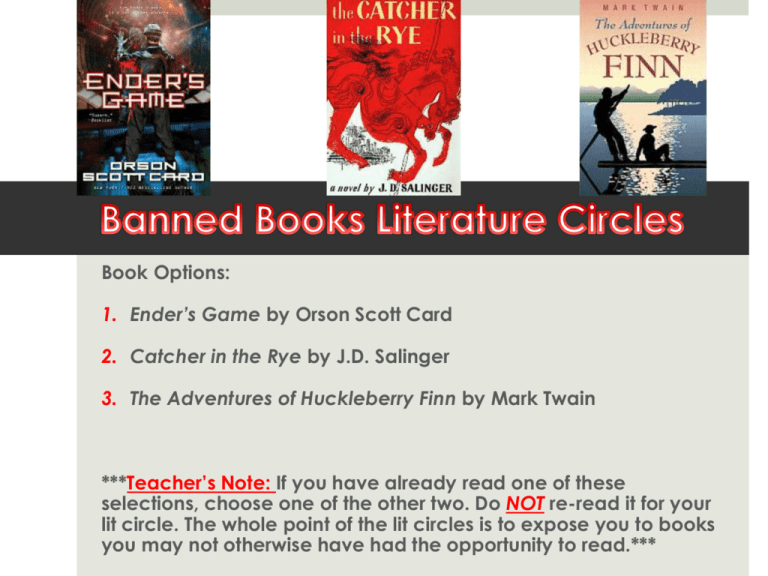
Book Options:
1. Ender’s Game by Orson Scott Card
2. Catcher in the Rye by J.D. Salinger
3. The Adventures of Huckleberry Finn by Mark Twain
***Teacher’s Note: If you have already read one of these
selections, choose one of the other two. Do NOT re-read it for your
lit circle. The whole point of the lit circles is to expose you to books
you may not otherwise have had the opportunity to read.***
By: Orson Scott Card
Orson Scott Card is a devout Mormon.
Card believes in imparting moral lessons
through his fiction, a stance that sometimes
creates controversy on both sides of the
fence.
Some Mormons have objected to the violence
in his books as being against the Mormon
message, while his conservative political
activism has gotten him into hot water with
liberal readers.
Card tries to keep his personal political
opinions out of his fiction. He tries to present
the governments of futuristic Earth as
realistically as possible without drawing direct
analogies to our current political climate. This
distance that Card maintains between the
real world and his fictional worlds helps give his
novels a lasting and universal appeal.
Card has won numerous awards, including
four Hugo Awards.
”Ender’s Game (Card) Bio.” LitLovers © 2015.
The main reasons cited include profanity, sexuality,
and the promotion of “anti-adult” attiitudes.
But… there's no sexuality in the book, unless
somebody thinks that showering naked is "sexual.”
As for profanity, the N word was used in a scene
where Ender was making an ANTI-racist point to a
racist character. Card rewrote the scene to eliminate
the word.
The original reason Ender was banned was because it
cultivated 'anti-adult attitudes.’
“The reason Ender's Game was first banned is
because it was placed on a ‘hit list’ of ‘evil books’…
many years ago, and it was placed on that list for no
other reason than that I'm a Mormon, and therefore
no children should be reading a book by me.” -Orson Scott Card
Nowadays, most efforts to boycott or ban Card’s
books stem from the fact that the Mormon Church
openly opposes gay marriage and continues to
regard voluntary homosexual behavior as sinful, and
Card has openly defended his Church's position.
Copyright © 2015 Hatrack River Enterprises Inc. All rights reserved.
Meet 6-year-old Ender Wiggin. He's monitored by
the government at all times to see if he is brilliant
enough to attend Battle School at a space station.
His story begins as he is tormented by his peers and
his big brother, and he’s had enough. He takes
action and resolves the problem. The government
sees his problem solving skills and decides it needs
to train him to become a war leader.
Problem? He has to decide whether to leave his
family and his planet at age 6 in order to train to
battle an alien race, who, society believes will
return to attack the Earth. If he goes, he has to
survive Battle School and grow up in an
environment that was never intended for children.
6-year-old boy growing up on future Earth
Brilliant: can effectively solve any problem
…but tormented by his peers and older
brother because of his brilliance
Monitored and essentially raised by the
government
Attends a harsh Battle School, where he
grows up isolated in an environment
without any adult mentors
Angry – adults are menacing obstacles,
not safe harbors as they are meant to be
Struggles to figure out how to be the
gentle and kind person he wants to be
despite his harsh circumstances and
surroundings
Wants to win
Is manipulation ever okay?
What is the role of leadership or
authority? Can we always trust
it?
Ender kills while trying to defend
himself. How far is it okay to go in
order to protect oneself from a
threat?
Conflicts arise because of lack
of communication and
understanding. Why is mankind
still content to enter into conflict
without attempting to fully
understand their “enemy”?
What is the distinction between
childhood and adulthood?
"The Catcher in the Rye Study Questions and Essay Topics." SparkNotes. SparkNotes, n.d. Web. 05 Mar. 2015.
“If you try and lose then it isn't your fault. But if you don't try and we
lose, then it's all your fault.”
“In the moment when I truly understand my enemy, understand him
well enough to defeat him, then in that very moment I also love him. I
think it’s impossible to really understand somebody, what they want,
what they believe, and not love them the way they love themselves.
And then, in that very moment when I love them.... I destroy them.”
“Perhaps it's impossible to wear an identity without becoming what
you pretend to be.”
“Humanity does not ask us to be happy. It merely asks us to be brilliant
on its behalf.”
Almost everyone I know who has read this book has
enjoyed it.
Yes! Suit up and defeat
the Buggers!
If you like action, adventure, battle
scenes, alien wars, and/or the scifi/fantasy fiction genre in general,
this is a book you will enjoy. It’s nice
because there’s a healthy dose of
universal wisdom and philosophy
dropped in as well – though in an
easily accessible way.
This book falls into the “brain candy”
department – it’s another fun, YA
fiction read.
Decide NOT to attend
Battle School and try a
different read.
If you dislike sci-fi and are
looking for something more
grounded in reality, you’ll
probably prefer one of the
other selections.
If you consider yourself a
strong reader, I would urge
you to read one of the
other novels – they will be
less like other books you
have read, and therefore
you will have new worlds
opened to you.
By: J.D. Salinger
J.D. Salinger was drafted to fight in World
War II.
While fighting overseas, Salinger began to
write The Catcher in the Rye which was
finally published in 1951.
Salinger did not escape the war without
some trauma, and was hospitalized after
a nervous breakdown.
Two years after the publication of
Catcher, J.D. Salinger left New York City
and retreated to a secluded farm in New
Hampshire. Salinger did his best to cut-off
contact with the public.
"J.D. Salinger." Bio. A&E Television Networks,
2015. Web. 05
The Catcher in the Rye is one of the most
controversial books ever written, but it is still
taught in many English classes all around the
United States, and is still loved by many
teenagers and adults for its rebellious
characteristics.
It was banned for its profanity, sexual
content, and violence by many schools from
the 60’s to the present.
Conspiracy theories about the book
“brainwashing” people abound because
the men who assassinated John Lennon and
JFK, and the man who attempted to
assassinate Ronald Reagan all owned
copies of the book. No evidence has been
found to suggest any truth to those theories.
Many schools have reinstated the book,
recognizing its literary importance.
35 Million copies were sold in total, and a
quarter of a million copies are sold every
year (“Year in books: J.D. Salinger by the
numbers.”).
Santipr. "Who Banned Catcher in the Rye and Why?" Who Banned Catcher in the Rye and Why? Teen Ink, n.d. Web. 01 Mar. 2015.
Meet 17-year-old Holden Caulfield. He's got a lot of attitude and lot of
dated profanity, and he wants to tell us all about "this madman stuff"
that happened to him "around last Christmas."
His story begins on a December Saturday at Pencey Prep School in
Pennsylvania, where he's just been kicked out for failing all his classes
except English.
Problem? He can't go home for a few more days (until Christmas break
starts), because he doesn't want his parents to know that he's been
expelled again.
So, instead, he decides to spend the next few days gallivanting around
Manhattan, soul searching, eventually deciding to run away.
Shmoop Editorial Team. "The Catcher in the Rye Plot Analysis." Shmoop.com. Shmoop University, Inc., 11 Nov. 2008. Web. 5 Mar. 2015.
17-year-old rich white kid who lives in New
York City
Constantly expelled from school
Wears weird red hunting cap -- ALL THE
TIME.
Is depressed and angry
Hates people and things he deems
“phony” or fake (almost everyone and
everything he encounters)
Idealistic – struggles to reconcile his view of
the way the world SHOULD be with its harsh
realities
Struggles to figure out who he is and where
his place is in the world
Wants to protect innocence and
goodness, particularly that of his little sister
Holden perceives childhood and
adulthood as two separate realms.
Are they truly separate? Where does
Holden fit in? Where do you fit in?
Is it possible to fully separate our
individual identity from our culture,
peers, and family? Is it even
desirable to do so?
Holden has an unhealthy obsession
with phoniness and wickedness,
which leads him to make
questionable decisions. How will this
affect his psyche?
How does one deal with the
“phoniness” and wickedness in the
world?
Is it possible for anyone to be truly
genuine and never commit a
hypocritical act?
"The Catcher in the Rye Study Questions and Essay Topics." SparkNotes. SparkNotes, n.d. Web. 05 Mar. 2015.
“All morons hate it when you call them a moron.”
“Grand. There's a word I really hate. It's a phony. I
could puke every time I hear it.”
“It was that kind of a crazy afternoon, terrifically cold,
and no sun out or anything, and you felt like you were
disappearing every time you crossed a road.”
“I think that one of these days," he said, "you're going
to have to find out where you want to go. And then
you've got to start going there. But immediately. You
can't afford to lose a minute. Not you.”
People generally either love this book or loathe it, & it almost
always boils down to how they feel about Holden Caulfield.
Yes! Come along for
the ride!
If you relate to Holden’s rage toward
hypocrisy and quest to find his identity
and place in the world, you will
probably like this book.
Catcher in the Rye is a “coming of
age” novel, all about the
protagonist’s journey from
adolescence to adulthood, and
the questions and struggles that
naturally arise from that transition.
Holden is angry with the world and
expresses his anger in a unique
way, known as “stream of
conscious” narration. He uses
plenty of foul language and 50’s
slang along the way.
…maybe you should fly
off and find a different
book.
If you think Holden sounds
annoying, you will probably
not like this book.
The narration style reads
like you are having a
conversation with this kid.
He may just come across
as a whiny jerk to you. If
so, it could be a long ride
of you wanting to punch
him in the face.
If you lack patience for
other people’s “issues,”
you may want to steer
clear so you don’t have
to deal with Holden’s.
By: Mark Twain
Born on November 30, 1835, in Missouri, Samuel L. Clemens
wrote under the pen name Mark Twain and went on to
pen several novels, essays, short stories, and travelogues.
He was also a riverboat pilot, journalist, lecturer,
entrepreneur, gold prospector, and inventor.
Mark Twain explored the American soul with wit,
buoyancy, and a sharp eye for truth. He became nothing
less than a national treasure.
He honed a distinctive narrative style—friendly, funny,
irreverent, often satirical and always eager to deflate the
pretentious.
"All modern American literature comes from one book by
Mark Twain called Huckleberry Finn," Ernest Hemingway
wrote in 1935. Hemingway's comment refers specifically to
the colloquial language of Twain's masterpiece, as for
perhaps the first time in America, the vivid, raw, not-sorespectable voice of the common folk was used to create
great literature.
At 34, this handsome, red-haired, affable, canny,
egocentric and ambitious journalist and traveler had
become one of the most popular and famous writers in
America.
”Mark Twain." Bio. A&E Television Networks,
2015. Web. 05
The main criticism is Twain's treatment of the
theme of race and his use of racial slurs in
reference to African Americans, Native
Americans, and poor white Americans,
especially the novel's portrayal of Jim (a
slave) and its repeated use of the N-word.
The thing to keep in mind is that the novel is
written in the vernacular of its historical
setting and the time period in which it was
written.
It was published in 1885, just 20 years after
the Civil War – which Twain lived through.
As a boy, Twain once saw a slave beaten
to death by his owner. People today find
this language offensive and some people
even believe the novel condones or
promotes racism.
Despite being a work of
fiction, this piece of literature
captures an aspect of
American history many
would prefer to “whitewash.”
Can deleting important
lessons from our history just
because it’s uncomfortable
be beneficial?
Most consider Twain's satire to be a
powerful attack AGAINST racism. Especially
since the main point of the novel is that
racism, and slavery in particular, is amoral
and nonsensical.
http://www.bcps.org/offices/Lis/models/twain/index.html http://www.pbs.org/wgbh/cultureshock/flashpoints/literature/huck.html
Meet 13-14- year-old Huck Finn. He's the scraggly, mischievous, hilarious,
uncivilized son of an abusive, back country alcoholic.
His story begins after he fakes his own death in order to escape his father’s
clutches. On his way out of town, he runs into a slave he knows, Jim, who has
run away from his owner. The two go on the run together, on a raft down the
Mississippi River. And many, many adventures ensue.
They have to keep Jim from being caught and taken back into slavery. They
almost drown. They run into criminals, feuding families, con-artists, and more.
Will Jim make it to freedom? Will Huck find his place in the world?
13 or possibly 14 year-old boy from small
town Missouri
Huck faked his own death to get away
from his abusive alcoholic dad and ran
away down the river with Jim.
He’s uncivilized. For a while he lived with a
widow in town who took him in, sent him to
school, dressed him nicely and tried to
teach him proper ettiquite. He hated it.
The freedom out on the river is much more
to his liking.
He’s mischievous and funny – he plays
jokes on people and always finds trouble.
Or at least, trouble always finds him.
He may only have received minimal
education, but Huck is incredibly
intelligent, resourceful, and quick-witted.
He struggles to understand “civilized”
people. For example, as he gets to know
Jim, he doesn’t get why slavery is
accepted as a morally right concept.
Is there any real way to escape our
problems and/or the evils in the world?
Are there “good” lies and “bad” lies?
What is the difference? Are both
“wrong”? Why does so much lying go
on in Huckleberry Finn?
Where do moral values come from?
Does Twain uphold or mock where
those values come from?
What is the importance of family?
What is their place in society? Do Huck
and Jim constitute a family?
Why might Twain have decided to set
the novel in a time before the abolition
of slavery, despite the fact that he
published it in 1885, two decades after
the end of the Civil War?
Why would Twain choose a child and
a slave – two rather helpless
characters – as his protagonists?
"The Adventures of Huckleberry Finn Study Questions and Essay Topics." SparkNotes. SparkNotes, n.d. Web. 05 Mar. 2015.
“There warn't no home like a raft, after all. Other places
do seem so cramped up and smothery, but a raft don't.
You feel mighty free and easy and comfortable on a raft.”
“It's lovely to live on a raft. We had the sky up there, all
speckled with stars, and we used to lay on our backs and
look up at them.”
“The average man don’t like trouble and danger.”
“I'd got to decide, forever, betwixt two things, and I
knowed it. I studied a minute, sort of holding my breath,
and then says to myself: ‘All right then, I’ll go to hell.’”
“Just because you’re taught that something’s right and
everybody believes it’s right, it don’t make it right.”
Amazing story, but the prevalence of the N-word is jarring
and the dialect is tough to get used to.
You may not be ready for this
book yet… but you should
read it eventually, because
it’s SO GOOD.
Yes! Get on
board the
raft!
You want to experience the best
protagonist literature has to offer.
(In Mrs. Barber’s opinion.)
You’re interested in the history of
the1800s.
You love adventure, humor, and
pointing out hypocritical flaws in
society.
You read well, you enjoy reading,
and you want to challenge
yourself with something different.
If you struggle with reading, I recommend you
wait to read this novel until you further build
your skills. There’s nothing in the story you
can’t handle, but the dialect Twain wrote the
story in is tough to get used to.
If you will be offended by the use of the Nword, you might pass on this. It’s used a LOT.
The condescending way white characters
speak to black characters is also very hard to
read in places. I had to keep reminding
myself:
1. The point of the novel is to highlight the
injustice of racism and slavery, and
2. In the time period in which the novel
was written, this would have been
commonplace. It’s important to learn
from history.
Length: 214 pages
Length: 281 pages
Difficulty Level: Easy (YA
Brain Candy)
Difficulty Level: Med.
(Author’s style,
symbolism, depth)
Difficulty Level: Hard
(Dialect, historical
context)
Offensive?
Lots of f-bombs and
other curse words, mild
sexual language
Offensive?:
Prevalence of N-word
and patronization
toward black characters
is rough to read. One
has to keep in mind the
overall message of the
book as well as the time
period it was written.
Offensive?: It’s not
***This is the tame
option. The other
selections are two of the
most frequently banned
and controversial books
in the United States.***
***Signed permission slips
will be required to read
Catcher & Huck.***
What am I getting into here?
Length: 324 pages
Factors to consider when making
your book selection:
Have I read this book before? If so, choose
another book offering.
Choose a book that will challenge you and pull
you up out of your comfort zone some. This is how
we grow as readers. Young Adult fiction is a great
genre, but it shouldn’t be all you read.
Am I mature enough to handle the content?
Are my parents okay with me reading this novel?
About how long does it take me to read 10 pages
of a book?

